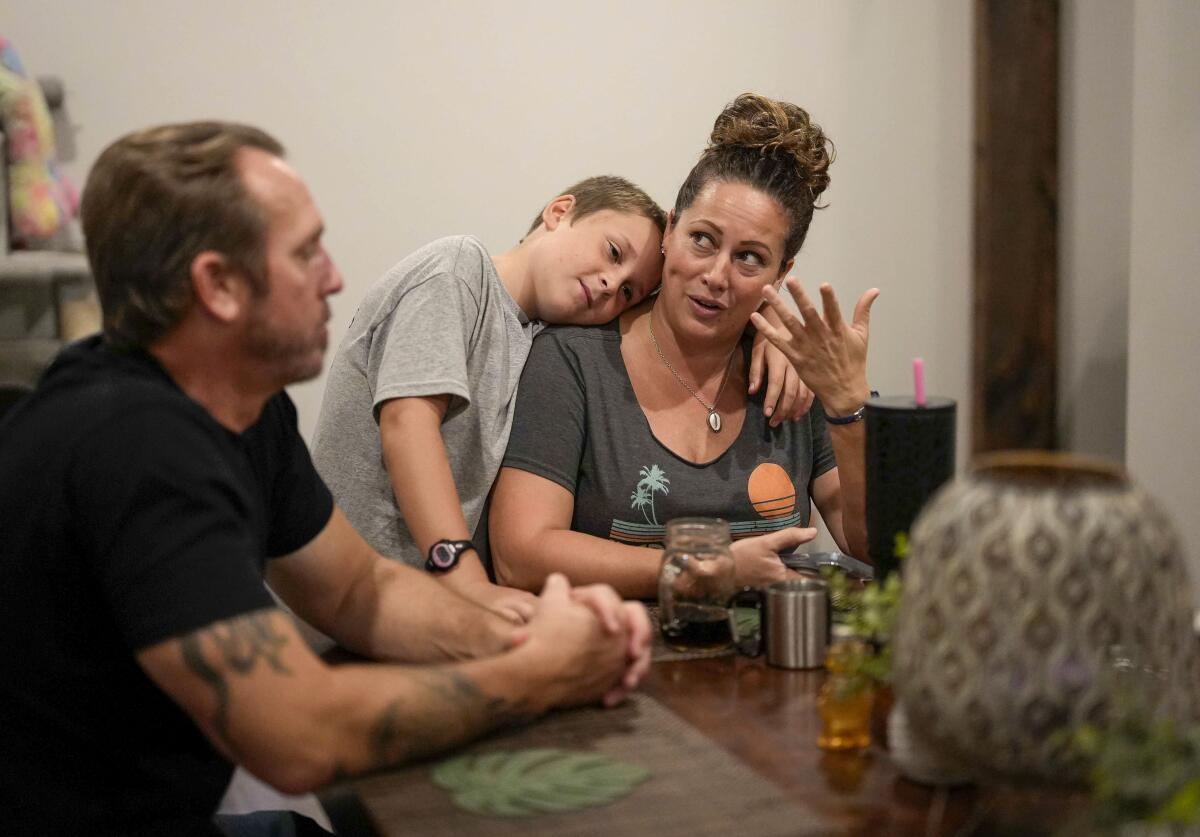
The Barbies lived in California, of course.
On summer days, as Sara O’Neil pranced her dolls along the muddy stream that ran through her family’s 168-acre Iowa farm, she could almost see them frolicking along a gleaming, palm-lined Pacific beach.
At 5 years old, she told her mom that she’d live by the ocean someday.
As an adult, she made her dream a reality. Sara joined the Navy, married, had four kids and, for more than two decades, built a life in Southern California.
Her sons became homegrown groms, surfing Imperial Beach with their dad and flipping skateboard tricks in downtown San Diego. Sara walked along the ocean every morning.
Then the COVID-19 pandemic hit, and with it the realization that the Golden State’s liberal politics didn’t align with hers. So Sara and her husband, Johnny, a Southland native with a sunny disposition to match, packed up and joined the droves of Californians leaving the state, some for political reasons.
In California, Sara and her family had been members of a political minority. In Iowa, the O’Neils have real power: They are part of a group of people — white conservatives — who exert disproportionate influence over the Republican presidential nominating contest. The state holds its first-in-the-nation caucuses Monday.
But despite their political beliefs, the O’Neils were surprised by the community they found in Iowa — and what they missed back in their home state.
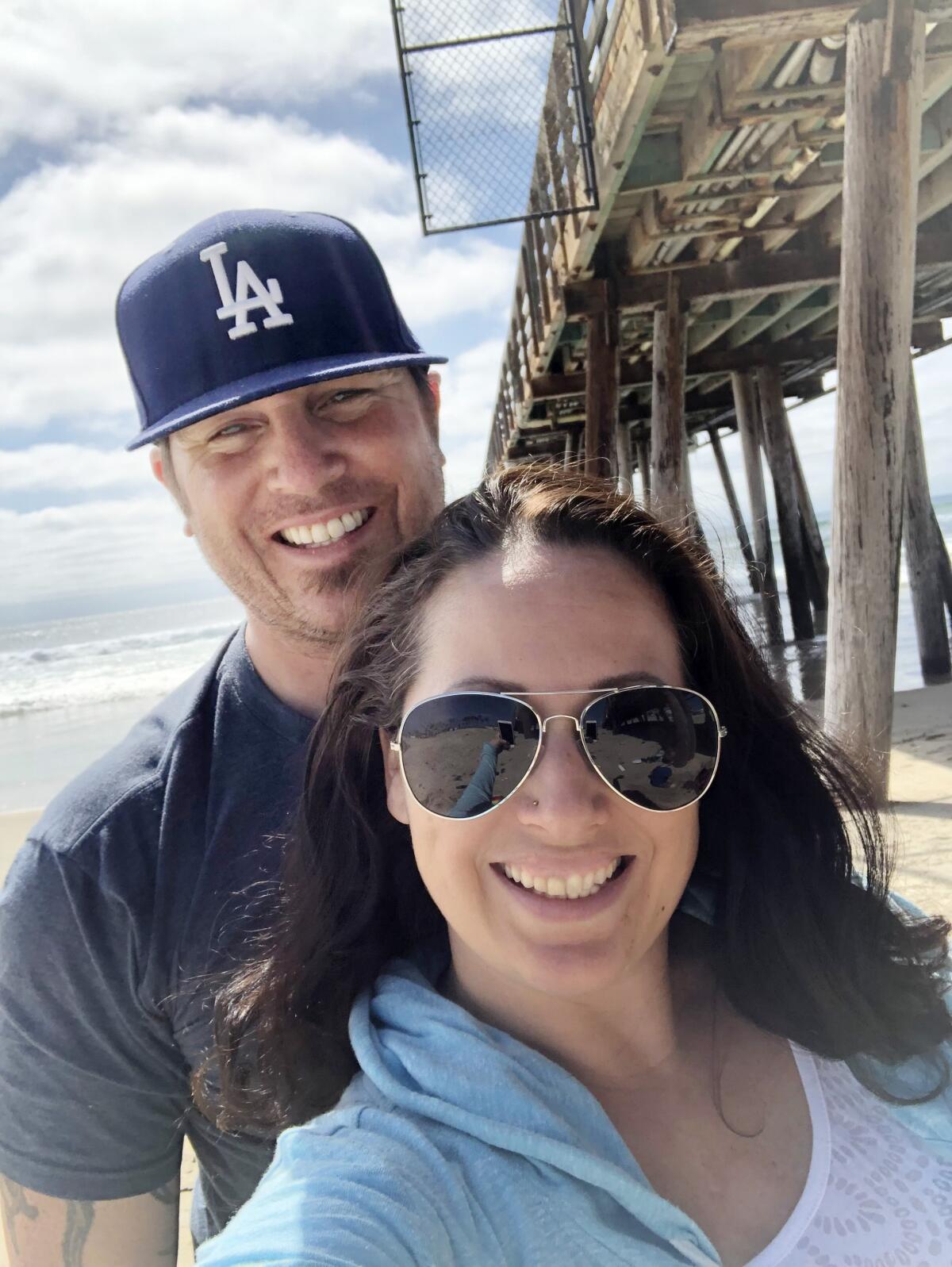
No single factor prompted the family’s move. But “COVID threw a wrench in everything,” Sara recalled. “It kind of opened my eyes a little bit.”
Suddenly, under public safety measures, she couldn’t visit her beloved beach without risking a fine.
Wanting to feel grounded during a tumultuous time, Sara and Johnny started going back to church. They picked Calvary Imperial Beach, a part of the sprawling Costa Mesa megachurch family. Their new church was meeting in person — in defiance of state restrictions on large gatherings.
Neither Sara nor Johnny wanted to get vaccinated. Sara, then a nurse at Sharp Mary Birch Hospital for Women & Newborns, managed to get a medical exemption because she said she’d experienced an anaphylactic shock with a previous vaccine. After three interviews, Johnny, a Navy vet turned firefighter, won a religious exemption.
Subscribers get early access to this story
We’re offering L.A. Times subscribers first access to our best journalism. Thank you for your support.
Still, COVID-era California weighed on them. Sara worried that she might be living in the end times the Bible prophesied. “I think it’s a warning,” she said later. “And there’s a lot of other things, but I think I was just not paying attention. And then COVID was like, pushed in my face.”
In 2021, Sara received a sign she couldn’t ignore — a Facebook message from an old Iowa classmate who’d lived for years in Oregon but was returning to the Hawkeye State.
The friend regaled Sara with stories that seemed to her too good to be true: Schools in Iowa were still open and operating, businesses weren’t encouraging racial justice protests — and houses cost under $200,000. And as Sara and Johnny soon learned, their new church had an outpost in Iowa, stocked with people like them.

In early 2022, Sara and her family packed up their California life and headed to the Midwest. They picked Randall, the smallest town they could find, and a property big enough for a chicken coop and a garden for Sara’s peppers and tomatoes.
They placed seashells on the kitchen shelf and slapped a magnet of the Ten Commandments on the fridge. They were home.
“Iowa doesn’t have a beach,” Sara said, “but I feel like we have freedom here.”
::
On a Sunday shortly after the O’Neils arrived in Iowa, they piled into the family car and drove the 25 minutes to Calvary Chapel Ames, a gray clapboard building with cheerful green eaves.
For the record:
10:47 a.m. Jan. 14, 2024An earlier version of this story incorrectly referred to Laurie Willson as a pastor of the Calvary Chapel in Ames, Iowa. She is the pastor’s wife.
“We just showed up one day and we’re like, ‘Hi, we’re from California!’” Sara recalled. “And they’re like, ‘We are too!’”
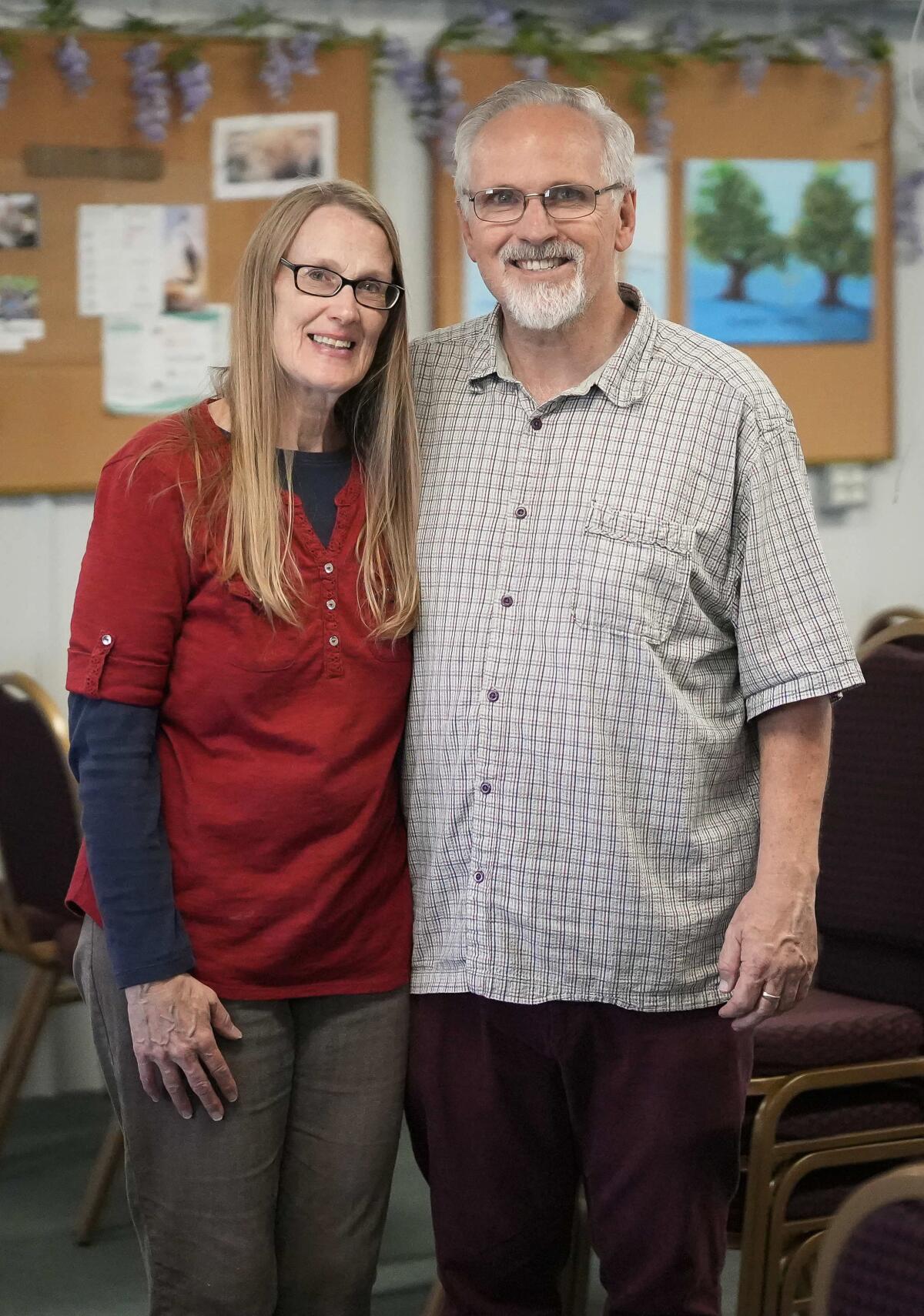
Kevin Willson, the church’s pastor, hadn’t intended to attract Californians when he and his wife, Laurie, planted a church here in 2012. Laurie, a homegrown Iowan, had moved to California in 1990 after graduating from college. A friend invited her to services at Calvary Chapel Placentia, where she met Kevin. Not long after they married, he became a preacher through Calvary’s school of ministry.
When a pastor friend asked for help starting a Calvary Chapel in West Des Moines, Iowa, the couple felt they were following God’s guidance.
“People would say, ‘Are you excited to come back home?’ And I was like, ‘Well, sort of. I’m more just excited to go see what the Lord has for us,’” Laurie said. “So, not so much, ‘Oh, I’m excited to be home in my home state.’ Because home to me was with my people in California.”
After a few years, the Willsons’ living room Bible studies morphed into a church. It didn’t take long for the Calvary Chapel name to attract West Coast converts — including a slew who had left California for redder pastures. The church attracts 30 to 40 attendees on any given Sunday, and members say about half are from the Golden State. A few moved for work, others for ministry. Several said they believed the Lord had called them to Iowa.
In the Ames church, the newcomers found a community of like-minded folks. Together they worried about vaccines, prayed outside Planned Parenthood offices and said blessings at antiabortion clinics. They passed along stories about California school boards that didn’t notify parents whose children began identifying as a gender different from their gender at birth.
“Laws like those, I would say, was one of my biggest factors,” said Deborah Stoner, a Huntington Beach native who found Calvary Chapel Ames within a week of moving for veterinary school at Iowa State University in 2017. “I’m never going to raise a kid in California.”
::
Sara and Johnny said they started noticing the differences in their children within a month of moving.
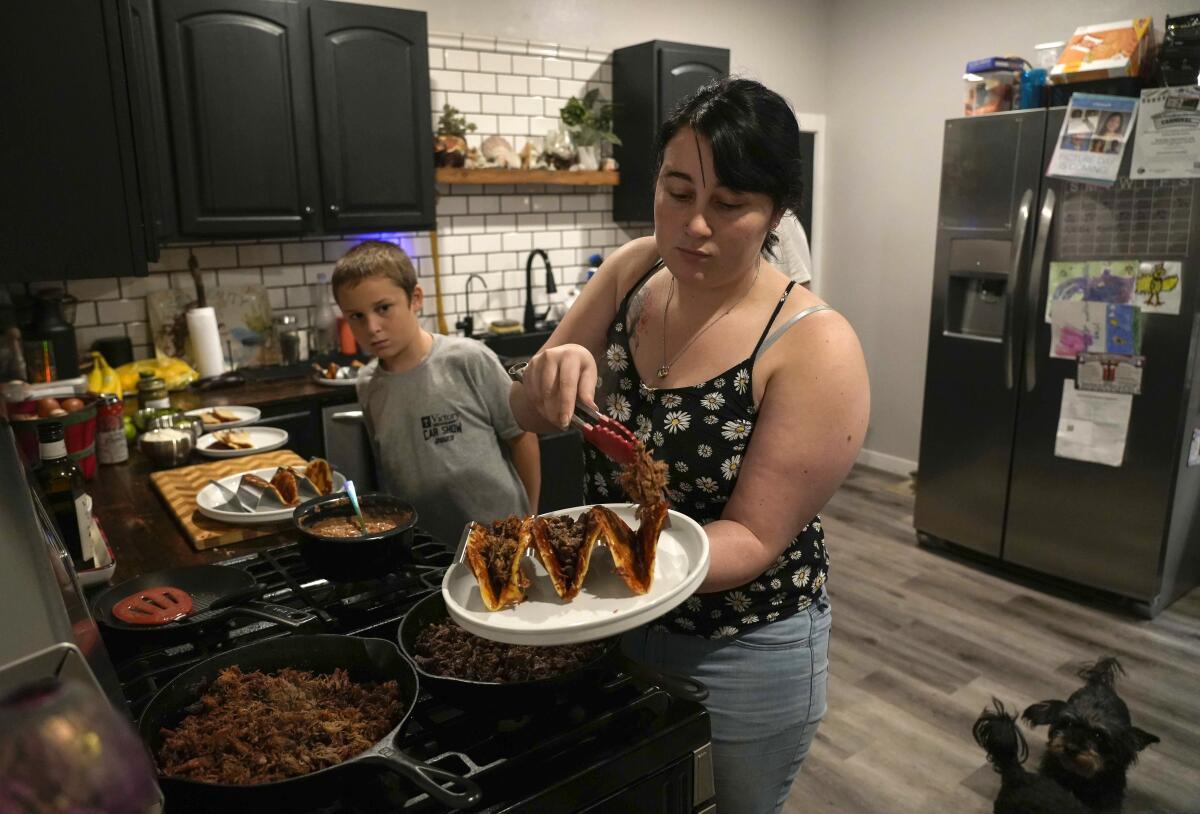
Tiffany, 20, got a hospital job, a boyfriend — and her own apartment, an unreachable aspiration in California. The youngest two, Christian, 9, and Dean, 7, flourished raising chickens and harvesting backyard green beans and onions to make dinners at home with their mom, she said. The O’Neils had worried that Johnathan, 18, had fallen in with a bad crowd in California. In Iowa, he got a fresh start in a new school. Sara and Johnny had brought their children far away from liberal California, where they disliked that their schools held LGBTQ+ pride events at school and trans students played sports alongside cisgender students.
Sara and Johnny flourished too, they said. They had no problem getting out of vaccine requirements. When Sara told the hospital where she got a job that she hadn’t been vaccinated against COVID-19, she said, managers immediately asked, “Would you like to apply for the religious exemption?”
And the couple said they found that their political views mattered.
Presidential candidates rarely visited Southern California, they said, except to raise money. But in Iowa, Republican presidential candidates have been touring the state for months, with frequent visits from former South Carolina Gov. Nikki Haley and Florida Gov. Ron DeSantis, who recently fulfilled his pledge to visit all of the small state’s 99 counties. Former President Trump, who is leading GOP polls in Iowa and elsewhere, kept a scarce schedule in the state until the fall, stepping up his outreach ahead of the first-in-the-nation caucuses next week.
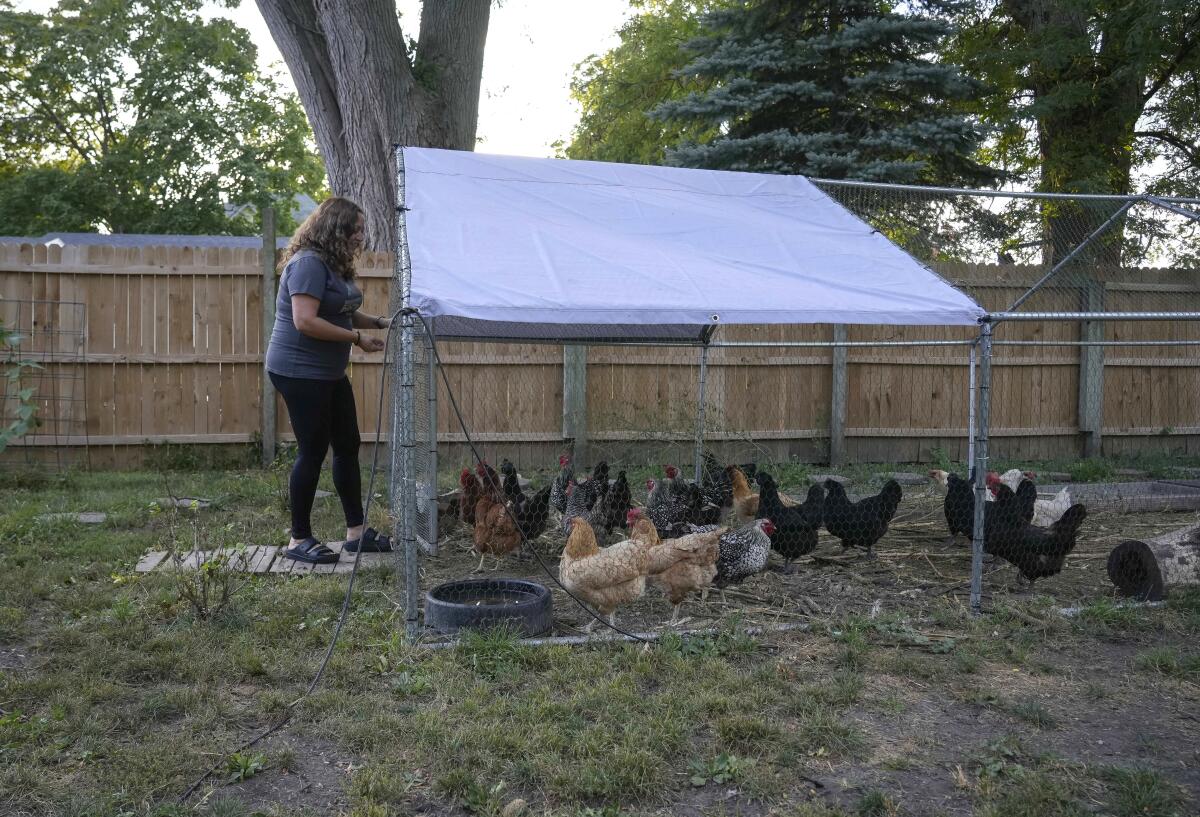
“There was no point of me even voting in California,” Sara said, adding that she didn’t vote half the time there. “Here, I feel like it’s a close 50/50. My thoughts do count, and they kind of align with a lot more people that live here. So I feel like I have a voice here.”
Johnny, she said, will more than likely vote for Trump, whose track record he trusts. Sara’s views are complicated. She blames Trump for the first pandemic lockdowns, and for funding vaccine research. Although Trump “was obnoxious to listen to,” Sara excuses his racist comments, such as characterizing Mexican immigrants as “rapists.” More important to her, she said, were the low interest rates and thriving economy — at least before COVID hit — of the Trump years.
The economy has grown under President Biden — and the high interest rates are set by the Federal Reserve, not the president — but recent polling shows that hasn’t helped him with voters. A registered Libertarian, Sara vehemently opposes Biden, whom she calls racist for his 1993 comments as a senator advocating for a tough-on-crime bill and calling to eradicate “predators on our streets.”
What worries her, she said, is the Democratic Party’s embrace of California Gov. Gavin Newsom. He has campaigned as a surrogate for Biden, appearing on a national debate stage in November against DeSantis.
“Bringing him in really scares me, because of all the stuff that went down in California,” she said. “He’s an attractive man. He’s also well-spoken, and people who don’t live in California … would really cling to him as a candidate if they didn’t go through some of the stuff we went through. It’s worrisome.”
Sara is considering switching her registration in time to caucus with the Republicans, her “secondary” party, on Monday. She doesn’t like Haley, whom she considers overly supportive of big government, but likes what she’s hearing from businessman and political newcomer Vivek Ramaswamy.
Even though she’s from the Midwest, Sara has spent most of her adult life voting as a Californian. She says she feels more empowered in Iowa.
“It makes me feel a little bit motivated to vote,” she said. “I used to define myself as … ‘I’m apolitical. I don’t feel like I have a say, I just separate myself from the whole thing.’ But now it’s a little bit different.”
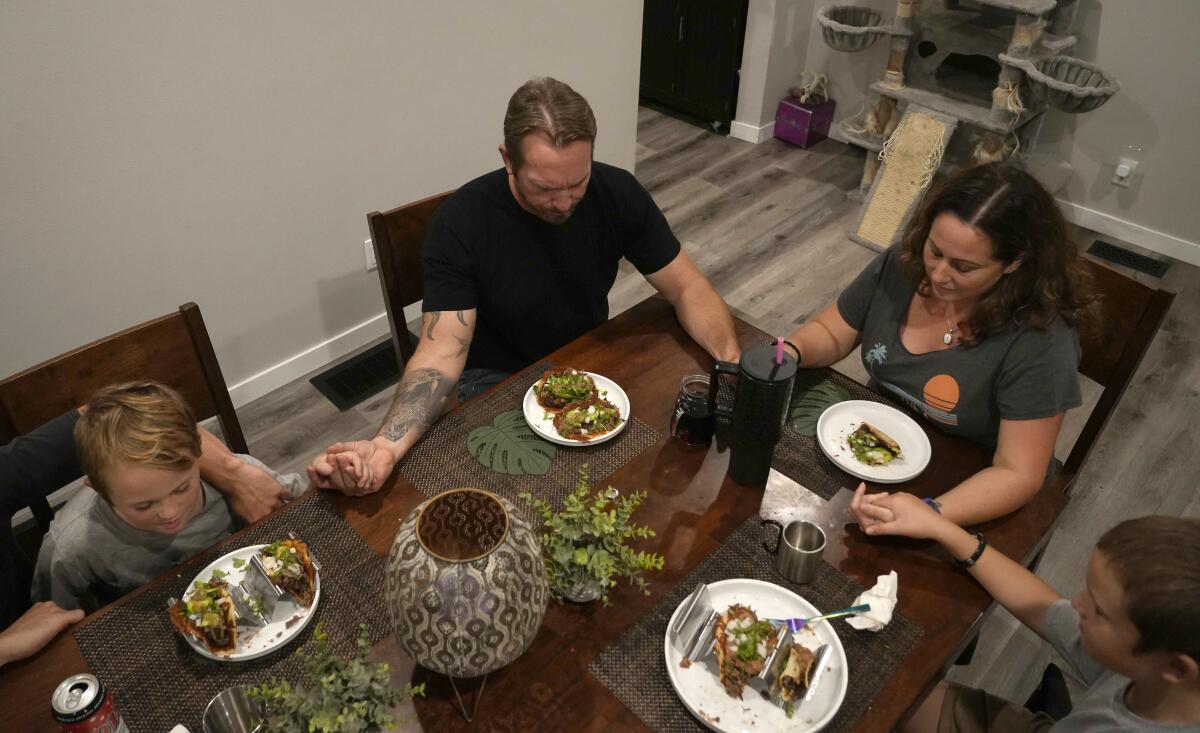
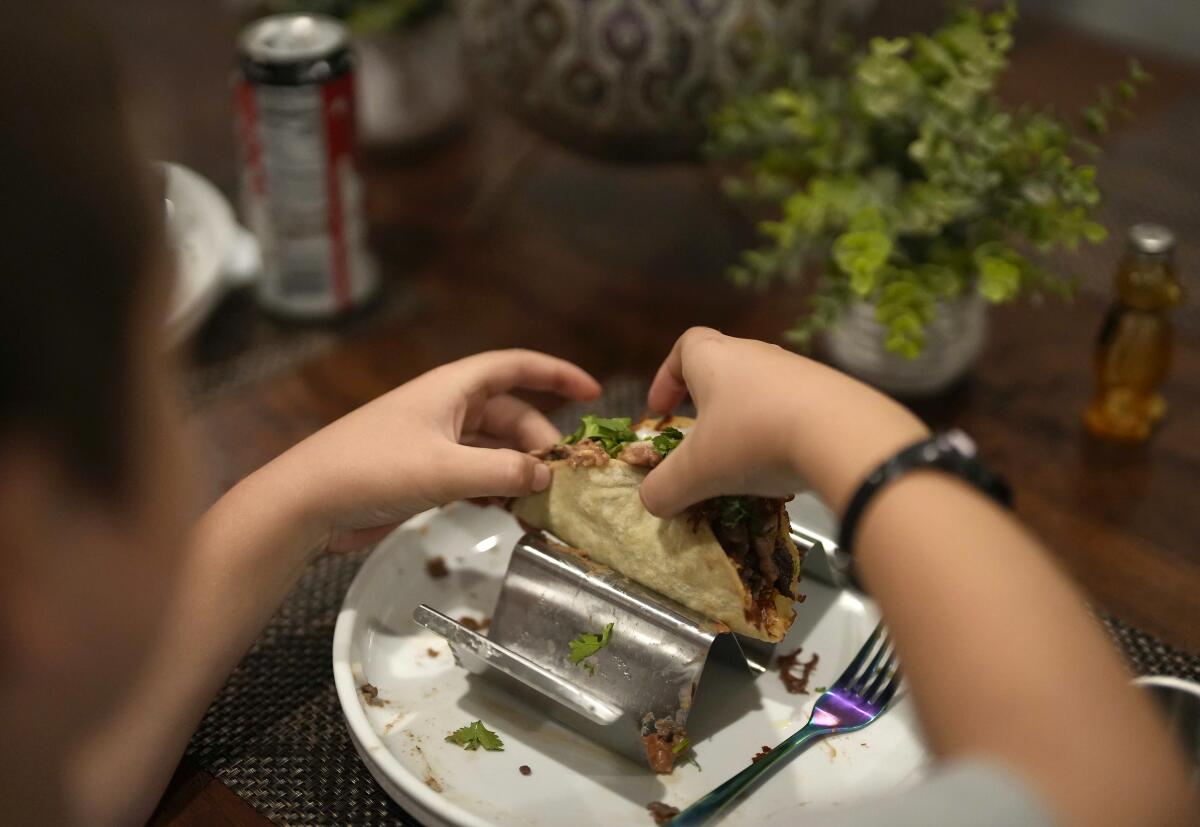
On a recent Thursday evening, the O’Neils gathered in their farmhouse for tacos — carne asada and carnitas made from Iowa’s famous brisket. Sara makes her own, California-style, because Iowa’s Tex-Mex version is “not [her] thing.” Artwork of ocean waves adorned almost every wall in the dining room, bringing California into their home.
Seated near a side table stacked with Bibles, Tiffany held hands with her little brother Christian and her boyfriend, Eli Bash, as her father said a prayer over the meal.
“We ask that you bless this family with peace, love and joy, and may our conversations be fruitful,” Johnny said. “Amen,” the family chorused.
The conversation swung from Johnathan’s decision to skip joining the football team to Sara and Johnny’s first date on a Hawaii beach, shortly after the 9/11 attacks.
“You weren’t there yet!” Sara told the kids, chuckling. “You weren’t even a thought in our mind yet.”
“None of you guys were,” added Johnny.
The couple, who both served in the military after Sept. 11, 2001 — Sara in the Persian Gulf — now doubt that Al Qaeda carried out the attacks, a view that is unsupported by evidence.
“I think 9/11 was a CIA mission, and I think they blew up that building,” Johnny said. “There’s too much evidence. I’ve seen too many videos.”
“It’s actually like a huge conflict, because everyone thanks me for my military service,” Sara said. “And part of me was like, yeah, I wanted to do something really cool. But I don’t feel a lot of pride in what we did in 9/11. We invaded another country, and we caused a lot of harm over there. And we lost a lot of American lives. We had no business being over there.”
Combined with their embrace of unfounded theories about the terrorist attack that led Sara to spend two tours overseas — as well as about vaccines, George Soros and the World Economic Forum — is a curious nostalgia for their liberal home state.
As Christian and Dean roughhoused loudly with Hallel — short for Hallelujah — the family’s big black Labrador, the oldest two kids reminisced with their parents about one of the things they miss most about California: the state’s diversity.
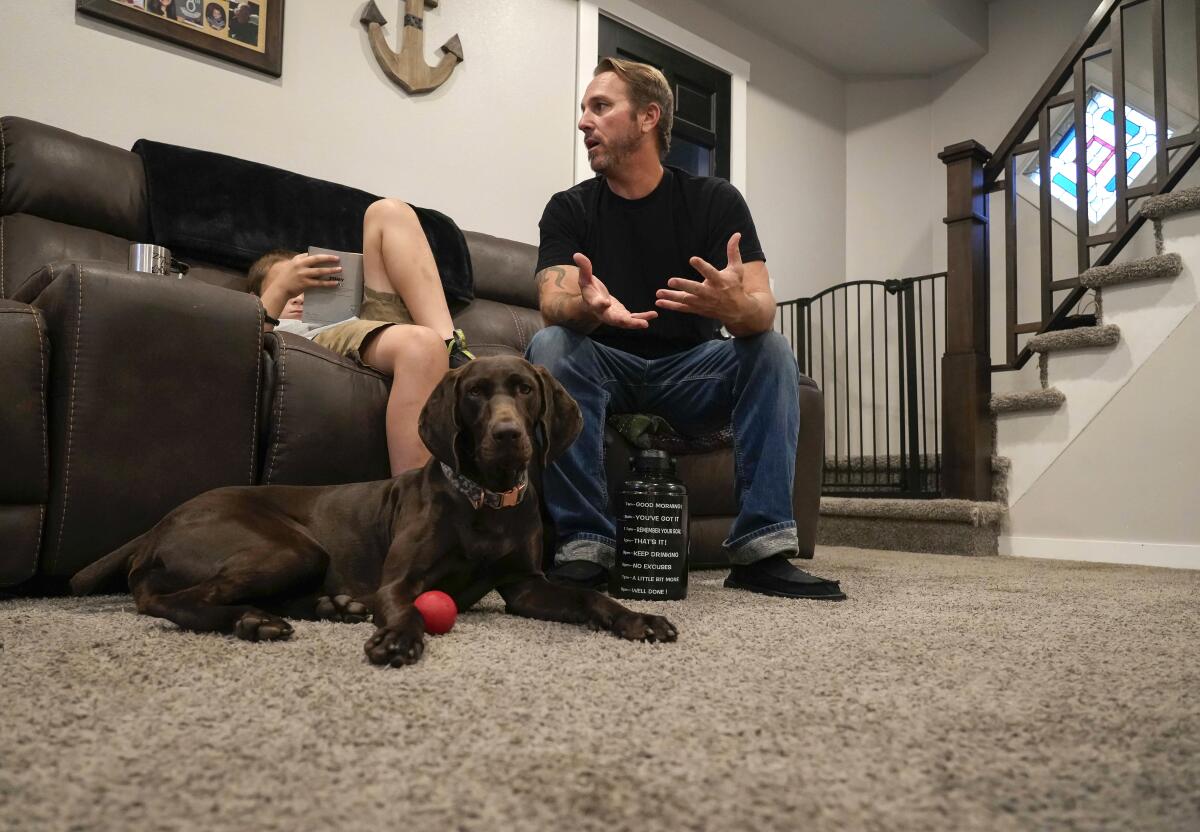
Tiffany and Johnathan said they were part of a white minority at their school in Imperial Beach, just miles from the Mexican border. At his Iowa high school, Johnathan still can’t believe how his friends at school casually use a derogatory slur as a nickname for the one Black student on the football team.
“I don’t get how they differentiate a joke and malintent,” Johnathan said. Usually, when he hears the term, Johnathan said, he’ll smile uncomfortably. He might try joking back.
“Casual racism, I will say, that’s a real thing,” he said. “I didn’t think it was a real thing until I moved out here.”
About six months after moving, Johnny said, the family visited the state fair. Overlooking the fairgrounds on a skyline ride, Johnny recalled saying, “Man, it is friggin’ white around here!”
Johnny suspects he has an easier time crossing “cultural lines” than native Iowans do. “Not to say they’re racist or have any sort of bigotry per se, but there is an unfamiliarness that is very noticeable.”
“I thought redheads were rare,” Sara responded, causing a ripple of laughter from her family.
After dinner, as the kids wound down and went to bed, Johnny and Sara wiped down counters in the kitchen and reminisced about how their lives have changed since moving to Iowa.
They insisted that they’re still all in, despite their gripes about Iowa’s lack of diversity and limited understanding of Mexican food. Two years into their stay, they are hoping to buy a 12-acre property in Radcliffe, about 10 miles away.
They’d have to sell the Imperial Beach house to cover the costs, but Sara says she’s ready to let go of her California dream. Now, she’s envisioning buying a couple of cows and transforming their new homestead into an event space on the weekend, a place where people can relax by fire pits, dine on California-style tacos and watch the sunset.
It won’t be by the ocean. But since leaving California, Sara’s dream has changed.